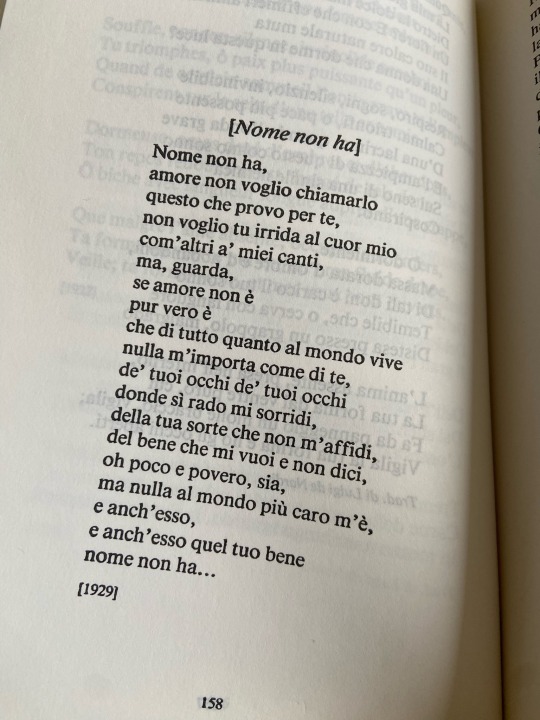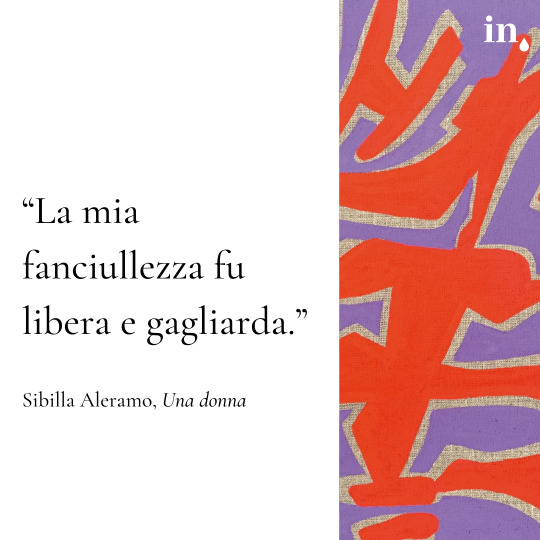#sibilla aleramo
Explore tagged Tumblr posts
Text
Italian literature tournament - First round.


Propaganda in support of the authors is accepted, you can write it both in the tag if reblog the poll (explaining maybe that is propaganda and you want to see posted) or in the comments. Every few days it will be recollected and posted here under the cut.
42 notes
·
View notes
Text

Son tanto brava lungo il giorno.
Comprendo, accetto, non piango.
Quasi imparo ad aver orgoglio quasi fossi un uomo.
Ma, al primo brivido di viola in cielo
ogni diurno sostegno dispare.
Tu mi sospiri lontano: «Sera, sera dolce e mia!»
Sembrami d'aver fra le dita la stanchezza di tutta la terra.
Non son più che sguardo, sguardo sperduto, e vene.
Sibilla Aleramo, Son tanto brava, da Momenti, 1921
39 notes
·
View notes
Text
This journey we called love With our blood and tears.
— Dino Campana, Orphic Songs, for Sibilla Aleramo, transl by I. L. Salomon, (1968)
22 notes
·
View notes
Text
Adolescente è il mondo, s'io lo guardo nelle pupille raggianti, tutto brividi e presentimenti (Sibilla Aleramo, Andando e stando).
9 notes
·
View notes
Text
" Io credo aver trovato il senso della vita generale. L'individuo non può esser felice per se stesso, perché in fondo a tutto ciò è la morte. Il segreto dunque della felicità anche per l'individuo mortale è di sentirsi immortale, di sentirsi cioè vivere dentro gli altri, dentro l'umanità, dentro l'Essere universale. La morte dunque non m'importa: ripugna a tutta la compagine che forma il mio essere, ripugna alla vaga coscienza che hanno tutte le mie molecole, tutte le unità elementari che formano di me una colonia; esse anzi mi faranno sentire tutta la loro forza coesiva al momento dell'atto: ma non ripugna alla mia coscienza superiore. Vivere è per me troppo doloroso: ogni sofferenza altrui si ripercuote ora in me con troppa violenza. Io potrei essere il più sfortunato dei miei simili e non soffrirei un millesimo di quello che soffro ora, che mi sento penetrato, inebriato da tutta la sofferenza degli uomini. Fuggire l'agglomeramento, la città, il contatto dei miei simili e rifugiarmi nei campi, isolarmi in mezzo alla natura sana e serena? Ma ora anche le lande, ove gli eremiti si seppellivano, sono proprietà d'alcuno e in nessuna parte tace l'eco della miseria… D'altronde è troppo tardi. "
Giovanni Cena, Gli ammonitori, a cura di Folco Portinari, Einaudi (collana Centopagine n° 43, Collezione di narratori diretta da Italo Calvino), 1976¹; pp. 186-187.
NOTA: l'unico romanzo del poeta di Montanaro Canavese fu pubblicato per la prima volta nell'estate del 1903 sulla prestigiosa rivista «Nuova Antologia», della quale Cena era redattore capo.
#Giovanni Cena#Gli ammonitori#letture#leggere#libri#anarchia#anarchismo#anarchici#poeti#età giolittiana#romanzo sociale#narrativa#Torino#Piemonte#pietà#solidarietà#Italo Calvino#Nuova Antologia#Montanaro Canavese#miseria#letteratura italiana#citazioni letterarie#narrativa italiana#Sibilla Aleramo#socialismo#alfabetizzazione#Agro Romano#povertà#sfruttamento#giustizia sociale
10 notes
·
View notes
Text

Sibilla Aleramo
37 notes
·
View notes
Text

Ciò che è sottile è incomunicabile. O tu intuisci la mia essenza o è tutto vano.
12 notes
·
View notes
Text


20 notes
·
View notes
Text
Saremo soli sulla terra.Bruceremo
3 notes
·
View notes
Text
Italian literature tournament - First round.


Propaganda in support of the authors is accepted, you can write it both in the tag if reblog the poll (explaining maybe that is propaganda and you want to see posted) or in the comments. Every few days it will be recollected and posted here under the cut.
10 notes
·
View notes
Text

185. Una donna
2 notes
·
View notes
Text
Your panther-like step […] Your glance of violated virgin Your step, silent as remembrance.
— Dino Campana, Orphic Songs, for Sibilla Aleramo, transl by I. L. Salomon, (1968)
18 notes
·
View notes
Text
se amore non è
pur vero è
che di tutto quanto al mondo vive
nulla m’importa come di te
Sibilla Aleramo
15 notes
·
View notes
Text

Sibilla Aleramo, Sono tanto brava, ultimi versi
8 notes
·
View notes
Text
And so we lavish on our own children all that we failed to give our mothers; denying ourselves and offering a new example of mortification, of self-annihilation. What if one fine day this fatal chain was to be broken, and a mother did not have to suppress the woman in herself, and a son learned about self-respect from her example?”
_ Una donna, Sibilla Aleramo _
9 notes
·
View notes
Text

Saremo soli sulla terra. Bruceremo. Prendimi. Tienimi. Io non ti lascio, bruceremo. Dimmi che mi manca così il respiro, perché mi chiami. Perché mi vuoi.
17 notes
·
View notes